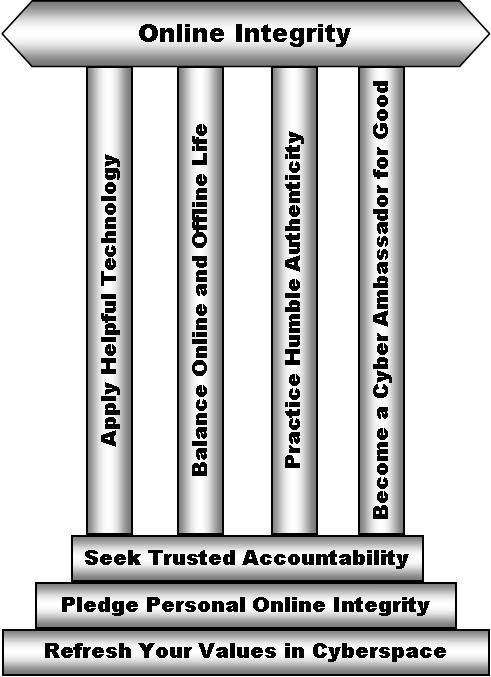In our previous post we began looking at the “Seven Habits of Online Integrity” from Dan Lohrmann’s book Virtual Integrity. We looked at the first three habits. These are foundational principles when it comes to living a life of integrity when using the Internet:
(1) Refresh your values in cyberspace;
(2) Pledge personal online integrity;
(3) Seek trusted accountability.
After we have done these things we are nead to move on to the next habit.
– – – –
Habit #4: Apply Helpful Technology
Dan Lohrmann writes in his book,
“Although most people will already have some level of software or internet service provider security and/or filtering service already in place, I urge you to reexamine your needs for a complete solution. . . . [S]tart thinking about what technology needs to be added or replaced.”
Lohrmann identifies three broad categories of current technology: (1) computer security (such as antivirus software, firewalls, spyware removal, etc.); (2) Web filtering software (sometimes called parental controls); and (3) accountability software.
All three types of software can help us have an online experience that is safe and promotes integrity. Some websites are ideal places for you to learn about the different technology options. As you research your options, look at a number of sources to give you product ratings. Also, know that while free software is good, it is not always the best choice.
Lorhman adds several comments about accountability software:
“[T]he majority of Americans have never been introduced to accountability software. . . . What is accountability software? Put simply, this software sends a report of all your Internet activities to your trusted accountability partner(s) to check up and provide metrics on. If this software is used by choice and not force, it can provide a powerful disincentive to viewing unacceptable material and surfing your values… The first accountability software company was Covenant Eyes…”
While other filtering software companies have starting providing some accountability features, usually these are for the purpose of monitoring children, not for adults holding other adults accountable to where they go online. Covenant Eyes has done things the other way around. We pioneered the concept of accountability software first, and only later added a filter as a support.
Lohrmann’s book offers great advice to computer users about a number of other important ideas: installation of your software, configuring software, and maintaining the technology properly once it is installed. If you aren’t very computer savvy, Virtual Integrity is a great place to start for help on these matters.
Habit #5: Balance Online and Offline Life
Because we live in this Internet age, there is always the risk of spending too much time online in a way that hinders our growth mentally, physically, socially, and emotionally. Taking a brief look around youth culture, for example, one can see a host of time-consuming, compulsive, and unbalanced uses of technology.
- Do you know someone who spends more time talking to others through IM and social networking than they do face-to-face?
- Have you ever met someone that spent countless hours in online gaming?
- Do you know any “information junkies,” people who can spend hours online just reading and researching with no clear goals or time restrictions?
- Have you ever seen simple miscommunications happen because of overuse of IM or text messaging?
More and more adults are finding that they need to discipline themselves in regard to time-management. This is not merely something children and teens need. Once you’ve established clear goals concerning “surfing your values,” establish good habits to limit your time online. Dan Lohrmann suggests the following:
- Set parameters for your surfing task; don’t just get lost in cyberspace. Schedule computer time: this will ensure you don’t use all your spare time surfing.
- If, possible, limit your time online to certain times of day. Using technology that limits times of day and amount of time is spent online.
- Close your email and turn off your instant messaging and RSS feeds if you don’t need them to be open.
- When doing Internet searches, have a goal in mind.
- Keep a running list of interesting links you uncover.
- If you are easily tempted by online pornography, choose not to use the Internet at vulnerable times (when you are hungry, angry, lonely, or tired). Find someone to hang out with instead.
- Schedule quality time with the people you love. For instance, you can establish family game nights.
- Beware of how vacations and holidays can be eaten up by time online. Make plans to do something with others during these times.
– – – –
Habit #6: Practice Humble Authenticity
“One clear pattern that repeats itself is this: pride often precedes problems regarding cyber ethics. . . . Too often we buy into the lie that science and technology will eventually solve all our moral problems, we continue to engage in immoral activities while waiting for the next round of innovation to somehow help—or even to bring salvation.” (Dan Lohrmann)
To avoid the pride that comes before the fall in surfing the Web, Lohrmann suggests three ways to practice humble authenticity as we work to surf our values.
1. Conduct honest self-examination.
What are you most tempted by online? Being honest with yourself about where you are the weakest will channel you in the right direction to get help. Once we get honest about this, Lohrmann suggests the following Web resources to help.
- Pure Desire Ministries – for sexual addicts
- John’s Piper’s article, “ANTHEM,” for fighting lust
2. Stay away from the “virtual cliffs” in cyberspace.
The Internet has a way of blurring the lines of our personal boundaries. The Internet is a place where “dabbling in sin” is easy and sometimes hard to detect. Lohrmann mentions several examples:
“Entering chat rooms ‘to help’ victims of an unfaithful spouse. Chatting on a dating website when married. Misrepresenting your background or credentials in an online resume. Redefining ‘online research’ to management at work. The list is endless.”
Be aware of where the “cliffs” are and know yourself well enough to steer clear of them.
3. Surf your true identity
The Internet is a place of anonymity. You can be who you want and say what you want and no one has to know who you are in your real life. You can choose any avatar to project “who you are” to others: the Internet empowers people to adopt whole new identities.
Avoid this tendency by always projecting your true self as a Christian. “Trust in the Lord with all your heart, and do not lean on your own understanding. In all your ways acknowledge him, and he will make straight your paths” (Proverbs 3:5-6). In everything we do, everywhere we go, even online, give acknowledgment to the Lord. Simply giving yourself the label “Christian” will change the way you interact with others online.
– – – –
Habit #7: Become a cyber ambassador for good
The gospel of Jesus is the good news that today is the day of God’s gracious, unearned favor, that a new creation is coming, and that the Spirit of God is transforming people’s hearts now as the first installment of this new world. We belong to another coming kingdom, one where the values of this world are overturned, where power, recognition, status, pleasure, and wealth are totally redefined by our relationship to the King, Jesus Christ.
As citizens of God’s kingdom we live by its values, and by doing so we influence the values of this world. This needs to apply also to cyberspace. We can venture into the Internet community as a representative of Jesus.
Start by using the Internet as a resource to find good Biblical teaching. There are so many good free resources available today online from renowned Bible teachers. If you aren’t receiving good biblical teaching, Lohrmann recommends we go to good websites like DesiringGod.org or RedeemerSermonStore.
Influence others you live with and work with to practice good cyber values. Even if your line of work doesn’t often lead you to talk about God, promote your godly values to those around you.
Use Web technology to advance worthy causes. Organize fund raisers. Start and join worthy causes on Facebook. Build good educational websites and blogs. Saturate cyberspace with helpful resources that relates to your area of expertise.
– – – –
The Seven Habits of Online Integrity
Putting these habits into practice and constantly monitoring your consistency with them will put us on the road to practicing online integrity.








As a school counselor, I am trying to teach my students about having integrity even in cyberspace. I am very interested in your principals related to “The 7 Habits of Online Integrity.” Thanks for sharing!